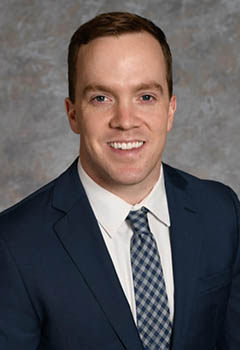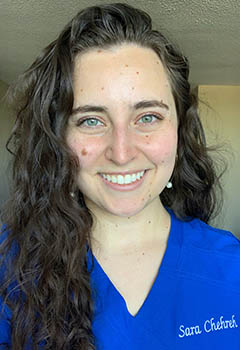2022 Scholarship Winners & Essays
Scholarship applicants were asked to write an essay of no more than 500 words that addressed the following topic:
There is a growing percentage of dentists, particularly new graduates, that have chosen to practice within a corporate setting rather than private practice. Some feel the corporate model provides them with all necessary benefits such as continuing education, insurance benefits, camaraderie, etc. Others feel it is still important to have ADA membership for the benefits offered, but as importantly for the advocacy that is provided on behalf of the profession. Do you feel there is value and relevancy in ADA membership for dentists practicing within a corporate setting? If NO, why? Offer some pros and cons to ADA membership within the corporate setting. If Yes, why? Offer some suggestions on how the benefits of ADA membership could be more effectively communicated to those practicing within a corporate setting.
The following are the scholarship winners and their essays. Congratulations to all!

Noah Kippenbrock, SIU
IGrowing up, my hometown streets were lined with various solo and small group practice physician offices. Now when I return home, the advertising for those offices is gone. In their place stand advertisements with no indication of medical doctor proprietorship. The human names on the signs have been replaced with generic terms for medical fields, ballooning corporations, or camouflaged government clinics. I pondered what changed in medicine in the past 20 years to cause this shift. The answer was not hard to find. One did not even need to ask it, for medical doctors were earnestly telling all the story of how their profession slowly changed from “theirs” to “someone else’s” right in front of them.
Their explanations primarily focused on a dearth of quality advocacy in their field. Polling shows dentists are members of their professional societies at far larger rates than their medical peers. This unity of voice and strength through numbers has allowed dentists to advocate strongly. This advocacy has a two-fold purpose – for our communities’ benefit and dental autonomy. Why is it vitally important for a dental organization to support not only its members but society? In accordance with the ethical principle of beneficence, dentists must do right for others. Dentists are the ones on the ground who are most in touch with the dental needs of their communities. Dentists know what is working and what is not.
Therefore, they often have the best understanding of how to help their communities. Following the principle of beneficence, dentists are encouraged to act on this knowledge. The ADA provides an avenue of action to assist in this wellness goal. Secondly, the ADA is key to maintaining autonomy for dentists through self-regulation. Appropriate standards give less reason for external regulators to demand influence. Thus, self-regulation through the ADA gives dentists the ability to practice how they, and the communities they serve, want them to practice. These two functions transcend differences between corporate and private practice. ADA advocacy serves all dentists and all people. With a clear understanding of the ADA’s purpose and of the recent decline in our medical colleagues’ autonomy, I firmly believe all dentists should appreciate active ADA membership for the wellness of the profession, themselves, and their patients regardless of how they choose to practice.
The key to maintaining high ADA membership is effectively communicating the risks of low membership rates and the benefits of high membership. This most effectively starts with looking toward future members rather than convincing practicing dentists already resolute in their ways. With persistent exposure during dental school to malleable students, even those who decide to work in a corporate setting will still value ADA membership. In my experience, the most effective way to communicate ideas is through in-person presentations in which the ADA advocacy accomplishments can be clearly highlighted and questions answered. Emails and magazines containing this information may be ignored or misplaced, but pizza served during an in-person ASDAS presentation over lunch will surely get dental students’ attention.

Mitchell Muller, SIU
The path to becoming a dentist involves devotion of our time, money, and tireless effort throughout dental school to learn everything we can in a relatively short period of time. With that being said, the field of dentistry is advancing at a rapid pace due to the age of technology so the learning must be continuous. Becoming a member of the ADA provides dentists with invaluable resources to continuing education allowing us to be life-long learners. I believe that when we make the conscious decision to enter a healthcare field it is our responsibility to keep our knowledge, techniques, and practices up to date.
A core value of the ADA is to share evidence-based insight to practitioners and without these insights we can quickly succumb to a mundane and average level of patient care. I do not want to fall victim to complacency nor see colleagues sputter. There is no better resource than the ADA to bring the most relevant research, CE, and evidence-based dentistry to practitioners in one centralized location. Further, as dentists we are trained to be highly skilled practitioners. The ADA allows us to focus our time, talents, and expertise in practicing dentistry while they advocate on our behalf. Dentists are husbands, wives, parents, community leaders, and healthcare providers. Having a voice in Washington D.C. would not be attainable by a sole dental practitioner due to the many hats that we wear. In obtaining ADA membership, we as practitioners can delegate this task to professionals that are trained in lobbying for the benefit of our profession.
The great hurdle is communicating the benefits of ADA membership to both private practice dentists as well as corporate offices. Different approaches should be tailored to corporate offices to create effective communication in order to relay the benefits of ADA membership. One of the most effective methods would be to utilize ADA representatives to open a dialogue by placing a representative in a corporate office for a visit. This would allow the representative to get first-hand experience to understand the daily life of a corporate dentist. More accurate advocacy could then be made in areas of need. The dentist would see that the ADA boasts a plethora of resources working for him or her. Representatives are the key as they can effectively communicate exactly where and how the ADA will benefit a dentist in either practice setting.
We each swore an oath during our respective white coat ceremonies to uphold the core values of the dental profession. It is imperative to maintain a robust support system to uphold our oath, whether pursuing a corporate or private practice career. A great quote by author Anna Barnes can summarize the value of an ADA membership, “Your support network is the solid ground from which you can propel yourself upwards.” The ADA is an invaluable support system that should be utilized by all dentists for the resources, guidelines, support, and advocacy to provide excellent dental healthcare to the public.

Martin Ryan, UIC
While the landscape of how dentists practice has changed in recent years, one thing has not: the importance of the ADA. Organized dentistry has remained, and continues to be, invaluable for the dental profession. Among countless areas, the ADA leads the charge in advocacy for dentists. Student debt is a major determinant of new graduates’ career decisions, and the ADA works for change while students may not even realize. This is just one issue of many the ADA fights for. Without the ADA, corporate dental organizations can simply advocate for what fits their business best. The ADA also provides top-notch education. The continuing education courses are led by experts in the field with various perspectives; C.E. at a corporation may be tailored so the dentist can better operate in that specific setting. C.E. courses and publications, like JADA, allow for dentists in all types of practice settings to have access to new, cutting-edge research as they try to grow their careers. Above all else, the ADA is an organization dentists can rely on. From COVID-19 protocols early in the pandemic to opioid prescription recommendations, the ADA provides its members up-to-date information and ensures its members are supported to practice as they see fit.
With such benefits, the value of an ADA membership must be communicated to corporate dentists. The first way of communicating this value is by reaching them prior to starting there. Many dentists in corporate settings recently graduated and were heavily recruited in school. With a major presence in schools, the ADA can access the students it needs to relay the value of its membership. Having ADA student representatives at each school provides direct communication. ADA members can also host events at schools or lead educational experiences to increase their presence. Staying active on social media, like Instagram, would also target this audience. Another way of ensuring corporate dentists understand the value is by empowering them. These dentists are still worried about debt from loans, barriers patients face to care, tax policies, and other issues. If the ADA can build on the strides already made and make tangible changes for dentists, the power of the ADA can grow. This would not only increase the value but also make corporate dentists want to be a part of it, understanding they too would benefit. Lastly, making the membership competitive to that of corporations can help in communication. Ideas like Class Pass and the ADA Accelerator Series are a great start to giving dentists an exclusive value in their membership. Adding to this with more resources for staffing, lower costs of equipment, and insurance benefits are just some ideas to engage members. These benefits would be a great selling point to communicate to corporate dentists who may be considering joining. No matter what setting dentists practice in, they are still dentists. Understanding this, the ADA helps all members to succeed in whatever path they take, and this is a value that is irreplaceable by any corporation.

Samantha Schaller, UIC
The corporate model of dentistry provides many attractive benefits, but the tendency is for these to be on the individual level – health insurance, retirement benefits, continuing education courses, etc. Young dentists are also growing as professionals in a society that consistently values individual gain over community gain, making these benefits all the more attractive. However, we are fortunate to be part of a profession that lets us reach beyond this individual level to have influence even at the national level. The ADA offers benefits in these areas that corporate dentistry cannot.
Even aside from the obvious large-scale benefits such as political representation and current research, one of the greatest benefits to engagement with the ADA is unity in our profession. General dentists, specialists, military dentists, private practice owners, US dentists abroad, and corporate dentists can all come together through the ADA. This has the added benefit of offering broader and more diverse perspectives than a new dentist might see in an exclusively corporate setting. Dentistry is a rapidly changing field in all aspects. It’s not just advancements in dental materials and digitization – it’s legislation determining who can access our care and who can’t. It’s the emergence of pseudo-dentistry on social media platforms, which can harm our patients just as much as it can benefit them. It’s even changes in how we are perceived as a profession by the general public.
The ADA’s job is to keep all practitioners current on these changes in the field, which may not necessarily be the priority of the corporate setting. Corporate dentists that choose to pursue these additional benefits may be even more valuable to their employers as they bring back new techniques and information to their corporations. With these changes comes a responsibility of the newest generation of dentists to remain engaged in organized dentistry, regardless of which branch we choose to enter. The rapidly growing divide between traditional dentistry and corporate dentistry can only be bridged through deliberate common involvement with organizations like the ADA that help guide the profession as a whole as we face these changes.
Therefore, ADA participation by corporate dentists is not just individually beneficial; it’s a necessity for the good of the profession as a whole. It is difficult for new dentists to consider the future of our profession as a priority when we are overwhelmed with what to do in the here and now. This is just as true for dentists in the corporate setting as it is for dentists in private practice. I think the ADA could help us think bigger – where is our field going? Are we happy with that direction? How can you support us through these changes? Answers to these questions help inspire all of us to think beyond the individual level and pursue the bigger benefits the ADA has to offer compared to corporate dentistry alone.

Sara Chehreh, Midwestern
Membership in the American Dental Association is a beneficial resource that all dentists should take advantage of, including those that practice in a corporate setting. Before attending Midwestern University, I worked as a Traveling Specialty Dental Assistant for a corporate dental company across seven office locations in Northern Virginia. After assisting multiple general dentists and contracted specialists, I did see some of the benefits of the corporate model; however, there was still much lacking. Though dentists in the corporate model can interact with one another, the ADA provides the opportunity for camaraderie and networking beyond that. There are opportunities to form strong bonds among all dental professionals, including those in private offices, corporate practices, military settings, and community clinics. There are also additional ADA membership benefits that many corporate companies do not provide. This includes information about and help with student loans, dental professional advocacy, travel benefits, and extensive CE courses. In particular, it is essential that we as future and current practicing dentists do not forget about dental advocacy. While the dental treatment we provide is vital to our patients, there is also great value in continued advocacy for issues such as prevention, student debt, the opioid crisis, and more.
This past spring quarter, our students at Midwestern University were lucky enough to have the current President of the American Dental Association, Dr. Cesar Sabates, speak during a lunch and learn session. He spoke to us with such genuine passion, both about his personal life and dental career, that we all felt the impact that the ADA community can provide. I believe there are opportunities for more lunch and learn sessions with the dentists at corporate settings. Especially beneficial would be having an ADA representative relay their experience with the benefits of membership. Another version of this is to have the ADA bring together dentists from private, community, and corporate practices that are all located in a specific local area and have them interact and discuss the benefits of ADA membership. These dentists can then discuss the pros and cons of being a member with each other and truly learn the extent of the benefits. Finally, I would recommend highlighting ADA news, benefits, and updates during morning huddles in corporate offices. From my experience, the entire team is together during this ten-to-fifteen-minute meeting, and this could be a great time to feature the ADA. This could highlight upcoming CE courses offered, ongoing advocacy in the dental field, and even information to help with dental insurance or practice transitions.
Overall, dentists in a corporate setting can only further grow as well-rounded practitioners and members of the dental community through ADA membership. We can then have the opportunity to seek help when needed and support others in the dental field throughout our careers.

Jessica Stacko, Midwestern
I start my final year of dental school next week. Despite how close I am to becoming a licensed dentist, I know that new challenges await me in terms of keeping my knowledge up to date in an ever-evolving field, dealing with the business and legal aspects of dentistry, and having my voice heard as a member of the profession. I believe all dentists can benefit from ADA membership, including those who practice in a corporate setting. I’ve come to this conclusion by asking myself the following question: What’s in the best interest of dentists, patients, and dental students?
With over 161,000 members, it’s evident that the majority of dentists find value in their ADA memberships. Without academic affiliations, many practitioners lack access to peer-reviewed publications. An ADA membership provides access to evidence-based research including the ADA Library and Archives and JADA. Members may also receive direct benefits in the form of CE, legal advice, discounted products, services, insurance, retirement plans, etc. These benefits can help practitioners on the individual level, but what’s most remarkable are the intangible benefits given to providers and patients alike. The ADA has created and supported numerous programs designed to benefit the underserved and at-risk populations, including the Give Kids A Smile program, the Oral Health Literacy and Awareness Act, and the National Health Service Corps.
Additionally, substantial revenue from ADA dues is used for advocacy. As a dental student I’ve personally benefited from legislative efforts put forth by the ADA, including receiving CARES-HEERF grants throughout the COVID-19 pandemic. These funds were initially limited to physicians, hospitals, and other healthcare providers, but the ADA advocated for dental providers and students to be eligible too. While typically not the case, CARES-HEERF also granted many significantly less interest on federal student loans. Currently, the ADA is working to mitigate dental school debt by supporting legislation for the POST GRAD Act, which would allow graduate and professional students to receive subsidized loans which are currently only available to undergraduate students.
Overall, the ADA is a non-profit organization whose mission is to help dentists succeed and support the advancement of public health. By comparison, the primary goal of corporations is to generate profit. I’m not implying that healthcare corporations don’t have the best interests for their patients and employees; these dentists may receive various benefits from their corporate employers. However, I would argue that a single corporation cannot compete with the inimitable benefits offered by the world’s oldest and largest dental association, especially since profit is not a goal of the latter. I feel the ADA could better communicate membership benefits to dentists practicing in a corporate setting by creating a more interactive social experience online. Implementing a Loyalty Program could also further help the ADA attract and maintain members. The ADA is the unifying voice of dentistry that supports and maintains the integrity of the dental profession. Ultimately, I feel we each have a duty as a member of the profession to support that voice.